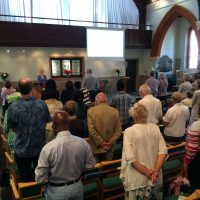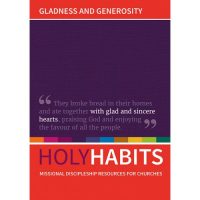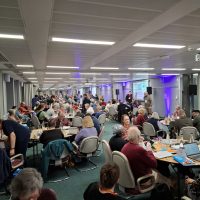Sermon given at St. Andrew’s Ealing Sun 7th May by Revd Sue McCoan
Ezekiel 34: 7-15
My brother-in-law is a farmer, mixed arable and beef cattle now, but at one time he also kept sheep. One day when we were visiting, he asked Jamie and me to help him move the sheep from the barn where they’d been kept over the winter, and where they had had their lambs, out into the open pasture. We’d seen the film Jean de Florette; we’d seen the shepherdess lead her little flock along, all following in a neat group like… well, like sheep. How hard could it be?
Off we went. It was quite a long track from the barn to the field, and we 2 and my sister were stationed along the track to guide the sheep, while Will went to open the barn. Well. First they wouldn’t come out; then he started to shoo them out; then the sheep who had come out realised their lambs were still inside and went back… and as all this was going on, the ones who had got out just scattered – across fields, down banks, into the ditch, everywhere. And I will just say, that up close a sheep is an awful lot bigger and heavier than they seem from a distance.
We never got asked to help with the sheep again. Will could spot a bad shepherd when he saw one.
And so could the prophet Ezekiel.
I mentioned earlier that there are images of God as the shepherd of his people in the Old Testament. But God had allowed the people to anoint a king, and they had a succession of kings and leaders who were called to be shepherds of the people on God’s behalf.
King David had been the best at that – perhaps not surprisingly, as David had himself been an actual shepherd when he was younger. He had fought off wild animals to protect the flock; he knew the responsibilities of the job. It’s generally thought that David wrote Psalm 23, because he knew what it meant to say ‘The Lord is my shepherd’.
Since David, however, there had been a succession of kings who, apart from the odd exception, had not been good shepherds. Ezekiel spells out, in the verses just before our reading, the ways in which they had fallen short.
‘You take care of yourselves, but never tend the sheep. You drink the milk, wear clothes made from the wool, and kill and eat the finest sheep. But you never tend the sheep. You have not taken care of the weak ones, healed those that are sick, bandaged those that are hurt, brought back those who wandered off, or looked for those that were lost.’
Ezekiel knows that a good shepherd cares for the weakest sheep. These are nomadic shepherds; the flock moves at the pace of the slowest animal. So you pay particular attention to the ones who find it hard to keep up; if they are all right, you can all move on. A good shepherd takes particular care of the lambs, because they are the investment for the future. A good shepherd will, if times get tough, put aside his or her own comforts in order to make sure the sheep don’t lose out.
A good shepherd, we might also say, has respect for other shepherds, and if there are disputes over pasture will negotiate calmly to achieve the best outcome for all the sheep, not just for their own. A good shepherd builds up the flock, and that means sometimes bringing in sheep from other flocks, to maintain the overall strength and health; those sheep then become an integral and valued part of the flock.
The leaders of Israel had manifestly failed in all these areas. They had cared for their own position, their own privilege, not for the people; they had taken advantage of the gifts of the people, but given nothing back. And the people have suffered. The sheep are ravaged, God says through Ezekiel, ‘by all the wild beasts and have become their prey’. The people are suffering and God will not stand by and let these so-called shepherds get away with it. God is going to intervene, to call these treacherous leaders to account, to strip them of their powers, and to call the people back directly to himself.
Quite right too.
But, we might be thinking, this is all so long ago, and far away…?
No it’s not. This is a story for right here in this country, right now. We believe, as Christians, that all earthly authority comes from God, and that earthly leaders are ultimately answerable to God. Our leaders, too, are called to be shepherds to the people, because God cares for all people. And you may have noticed, we have an election coming up. And while it’s not all right for me to tell you which party to vote for, I can offer you some questions to ask.
So ask yourselves how our present leaders measure up as shepherds. Are they caring for the weakest, the most vulnerable? Are they investing properly in children and young people?
Ask yourselves how they are handling austerity. Are they making sacrifices themselves in order to protect the flock? Look where the cuts have hit hardest, and at the cuts that have been agreed but have yet to take effect. What shepherd would say, times are hard so we’ll have to cut back on feeding the lambs?
Ask yourselves if our leaders are really accountable for their decisions. You know the story of the man who has 100 sheep and that notices that one, in all that number, is missing and goes to look for it. A good shepherd may delegate some tasks but never gives up the responsibility for each and every sheep in his care.
Ask yourselves if our leaders would see that this junior doctor who is too tired to get home safely, this mother and daughter who are sleeping rough because they just couldn’t afford their latest rent rise, this working parent needing the food bank, this disabled person whose carer cannot stay overnight, this teacher who is thinking of leaving because their heart is broken by the constant changes to policy – would our leaders see, as a good shepherd would, that each one of these human beings is my responsibility, and I look after their needs before I give presents to my friends.
Ask yourselves if our leaders are strong, building up trust with people in all walks of life, or are they being strong by grabbing hold of power?
Ask yourselves if our leaders are failing us, as the leaders of Israel failed their people. The sheep then were prey to the wild animals of invasion from other countries. These days, if our leaders are failing, people become prey to the wild animals of extremism, and we have seen the rise of nationalism and the far right.
Ask yourselves if our leaders are good shepherds. Because if you see that this is not happening, then it is up to us to do something about it.
We have an election coming up. We are already being told that the result is a foregone conclusion, that Mrs May will still be our prime minister. If that’s the case, then this is not an election about the party leaders, so don’t be side-tracked on that issue. This is an election about democracy, and how we hold our leaders to account. And we can send a message – through challenging our candidates, through public meetings, above all through our vote – we can send a message that we care, and we want our leaders to care too.
We care about those in need, those who are least able to speak for themselves. We show our care, we run food banks, and night shelters – but we call on our leaders to end the scandal that in a country as rich as this, there are so many people who need this provision. We care about our older people and we want to know they will be safe and looked after. We care about our schools and our hospitals. We care; most people care; now let’s ask our candidates, not whether they care, because they will all say yes, but how. How are they going to care?
We know what a good shepherd looks like. We are answerable to the greatest good shepherd ever, Jesus. This election is an opportunity to call our leaders to account to be good shepherds to all the people, regardless of which party is in power. If you’re not registered to vote, do it now – the deadline is 22nd May. And then let’s pray, let’s examine our conscience – and let’s get out there and use our vote and our voice.
Amen.





